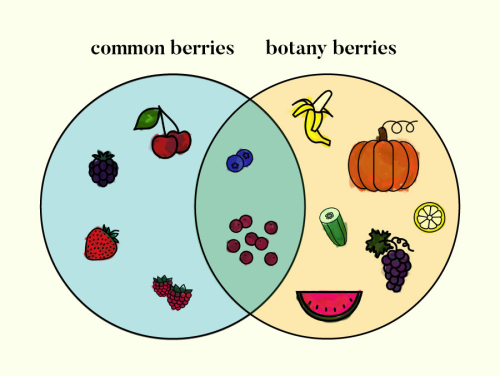It turns out berry is actually a botanical term, not a common English one. Blackberries, mulberries, and raspberries are not berries at all, but bananas, pumpkins, avocados and cucumbers are. So what makes a berry?

Well, a berry has seeds and pulp (properly called “pericarp”) that develop from the ovary of a flower. The pericarp of all fruit is actually subdivided into 3 layers. The exocarp is the skin of the fruit, and in berries it’s often eaten (like in grapes) but not always (like in bananas). The mesocarp is the part of the fruit we usually eat, like the white yummy part of an apple, or the bulk of a plum, though in citrus fruits the mesocarp is actually the white, sort of inner-peel that we remove. Last is the endocarp, which is the closest layer that envelopes the seeds. In stone fruits, it’s the stone. In many fruits, it’s actually a membrane that we don’t really notice, often because it’s been bred to be thin, like in bananas. In citrus, the endocarp is actually the membrane that holds the juicy parts of the fruit, that is, the part you don’t want to pierce unless you want to get sticky.
If most fruit have these 3 layers, then why are berries special? It’s mostly due to the nature of their endocarps. Although not exactly quantified, berries generally have thin endocarps and fleshy (not dry) pericarps. Of course, these rules aren’t rigid, as watermelons and citrus fruits are berries, and neither are thought to have especially thin skins.
So if your favourite fruit isn’t a berry, what might it be? If it has a thick, hard endocarp, it’s probably a drupe, a fancy term for a stone fruit. This group encompasses apricots, mangoes, cherries, olives, avocados, dates and most nuts. Basically, if you wouldn’t want to just bite into it, it’s probably a drupe.
If your snack has a core, it’s probably a pome. From its name you probably guessed that this bunch includes apples, as well as pears. If you’re a bit more adventurous, your favourite breakfast might include a multiple fruit, which is a fruit that is actually make up of a cluster of fruiting bodies. Some examples of this are pineapple, figs and mulberries. These fruits turn out to be part of a greater group called accessory fruits, in which the fruit (or many fruiting bodies) is not derived from the ovary, but some other part of the developing plant. This is where the “not-a-berry" strawberry falls.
Finally, if you, like me, consider your favourite fruit to be a raspberry or blackberry, then you love aggregate fruits. These are formed by many ovaries merging to become one flower, and most are also accessory fruits. Botany is weird, isn’t it?
Berry weird.







